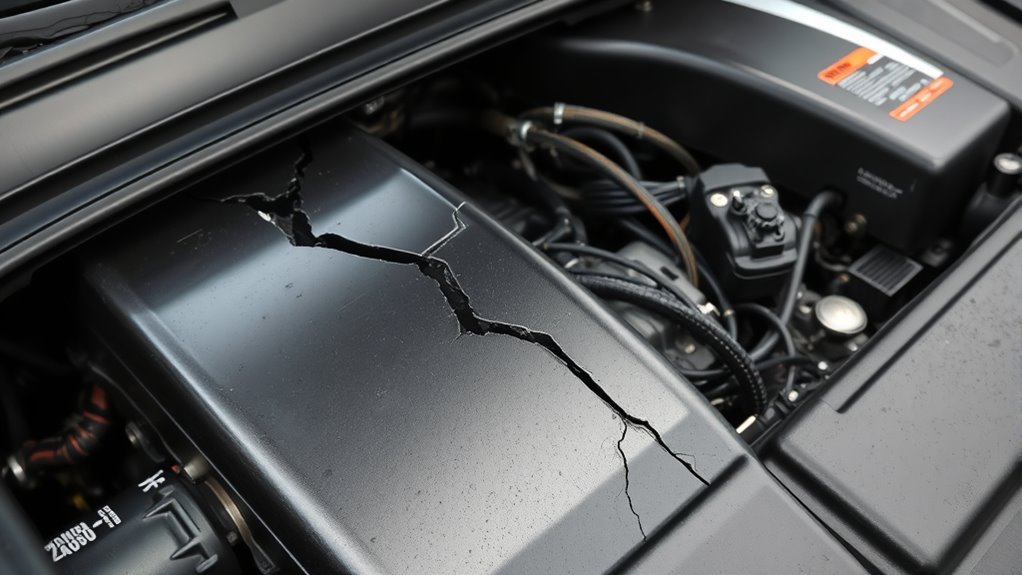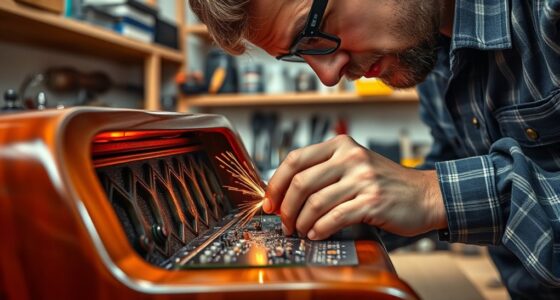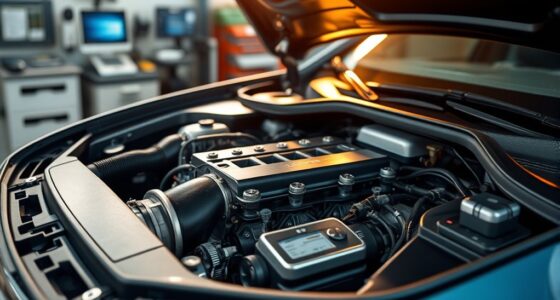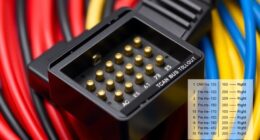To keep your car warranty valid, you need to follow proper maintenance schedules, like regular oil changes and brake checks. Avoid aftermarket modifications, such as custom exhausts or performance chips, which can void the warranty. Using incompatible or non-approved parts also risks invalidating coverage. Keep detailed records of all service visits to support any claims. If you want to understand exactly what can cause warranty loss and how to protect it, you’ll find useful details ahead.
Key Takeaways
- Neglecting recommended maintenance, such as regular oil changes and brake inspections.
- Installing aftermarket modifications that alter vehicle performance or emissions.
- Using unapproved or incompatible replacement parts during repairs.
- Failing to keep detailed maintenance and repair records.
- Repairing the vehicle outside authorized service providers or not following manufacturer guidelines.
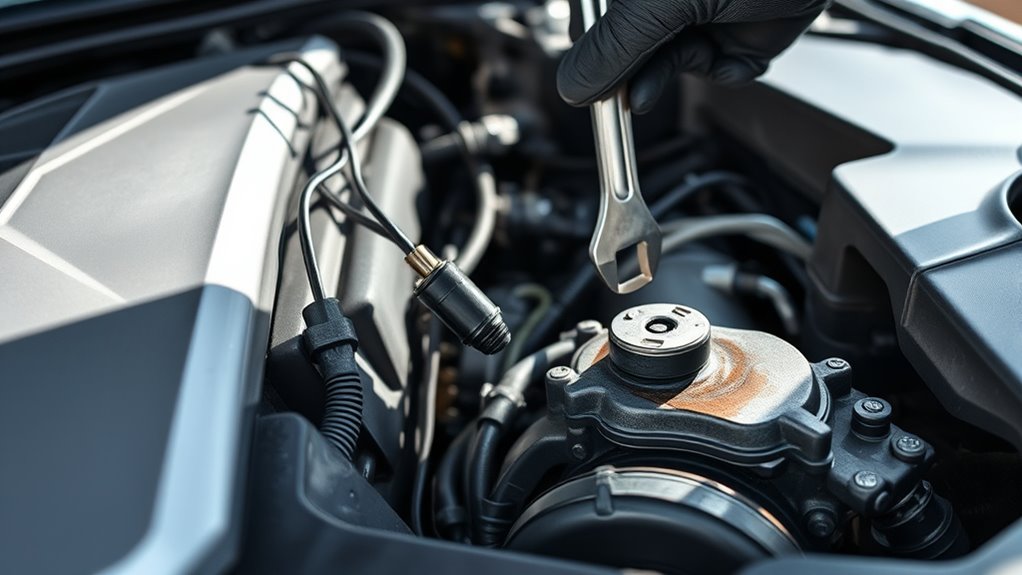
Understanding how your actions can void your car warranty is essential to protecting your investment. Your warranty is designed to cover repairs and replacements resulting from manufacturing defects or normal use, but certain behaviors can jeopardize that coverage. One key factor that can lead to warranty voidance is neglecting proper maintenance. If you consistently ignore recommended service intervals or use substandard parts, your manufacturer may refuse to honor warranty claims. For example, failing to change the oil regularly, neglecting brake inspections, or not addressing warning lights can be seen as neglecting your responsibilities as a vehicle owner. These maintenance issues might not only cause more serious damage but can also be used to justify denying warranty coverage since they suggest improper care or misuse.
Neglecting proper maintenance can void your car warranty and lead to denied coverage.
Another significant element that can void your warranty involves aftermarket modifications. When you alter your vehicle beyond factory specifications—such as installing aftermarket exhaust systems, performance chips, or custom suspensions—you risk voiding parts of the warranty. Manufacturers often specify that modifications that increase power, alter emissions, or change the vehicle’s structure can interfere with the factory-designed systems. If a problem arises and it’s linked to these modifications, the manufacturer may refuse to cover the repair. For instance, installing a non-approved turbocharger or remapping the engine control unit (ECU) might boost performance but could also damage components or lead to issues that are not covered under warranty. It’s imperative to review your vehicle’s warranty policy and consult with the manufacturer before making any aftermarket changes.
Additionally, using unapproved or incompatible parts during repairs or replacements can also void your warranty. If you opt for cheap, off-brand parts instead of original equipment manufacturer (OEM) parts, your warranty provider might deny coverage if issues develop. The manufacturer’s warranty is based on the assumption that original parts and proper procedures are used for repairs. By bypassing recommended parts or procedures, you can unintentionally invalidate your warranty.
Furthermore, neglecting to keep detailed records of maintenance and repairs can complicate warranty claims. If a dispute arises, having documented proof of regular servicing and adherence to manufacturer guidelines can make a difference. Conversely, missing records or inconsistent servicing may give your warranty provider grounds to deny coverage. Also, failure to follow the manufacturer’s recommended interest rate and financial guidelines for repairs or service plans might impact warranty validity, especially if financed or leased through third-party agreements.
Frequently Asked Questions
Can Using Third-Party Parts Void My Warranty?
Using third-party parts or aftermarket components can void your warranty if they cause damage or aren’t approved by your manufacturer. Car makers prefer original equipment manufacturer (OEM) parts, so if you install third-party components that lead to issues, your warranty could be voided. Always check your warranty terms and consult with your dealer before installing aftermarket parts to avoid unintentionally voiding your coverage.
Does Neglecting Regular Maintenance Affect Warranty Coverage?
Neglecting regular maintenance can definitely affect your warranty coverage. If your vehicle shows signs of maintenance neglect, manufacturers might see this as a breach of the warranty terms, leading to warranty consequences. Regularly servicing your car as recommended helps keep the warranty intact and prevents potential disputes. Skipping scheduled maintenance could be interpreted as misuse or neglect, which may void parts of or the entire warranty, leaving you responsible for costly repairs.
Are Warranty Voided if I Modify the Vehicle?
Yes, your warranty can be voided if you modify your vehicle, especially with aftermarket accessories or engine tuning. Manufacturers often specify that non-approved modifications can nullify coverage because they alter the vehicle’s original design and performance. If you plan to add accessories or tune your engine, check your warranty terms first. Keep detailed records of any modifications to avoid disputes later, and consider professional installation to reduce risks.
How Does a Dealership’s Repair Choice Impact Warranty Validity?
When a dealership chooses repair methods, it can impact your warranty’s validity if they don’t follow manufacturer restrictions and use authorized repairs. If they use unapproved parts or repair techniques, your warranty might be voided. Always guarantee the dealership adheres to manufacturer guidelines and uses authorized repairs, so your coverage stays intact. This way, you protect your vehicle’s warranty and avoid potential issues down the road.
Can Insurance Claims Void My Car Warranty?
Imagine your car’s warranty as a fragile glass shield, easily cracked by insurance disputes or warranty exclusions. When you file an insurance claim, if it involves repairs that aren’t covered or violate warranty terms, it can void your warranty. Insurance disputes often lead to misunderstandings, risking your coverage. Always read the fine print, and guarantee that claims don’t cross warranty exclusions, or you might find your warranty shattered when you need it most.
Conclusion
So, while you might think taking shortcuts or ignoring recommended maintenance would save you trouble, it actually might just void your warranty. Ironically, the very actions meant to save you money can end up costing you thousands in repairs. It’s funny how neglecting simple guidelines can turn your trusted car into a costly mistake. Keep up with maintenance, or risk finding out the hard way that sometimes, following the rules is the best way to save money.
